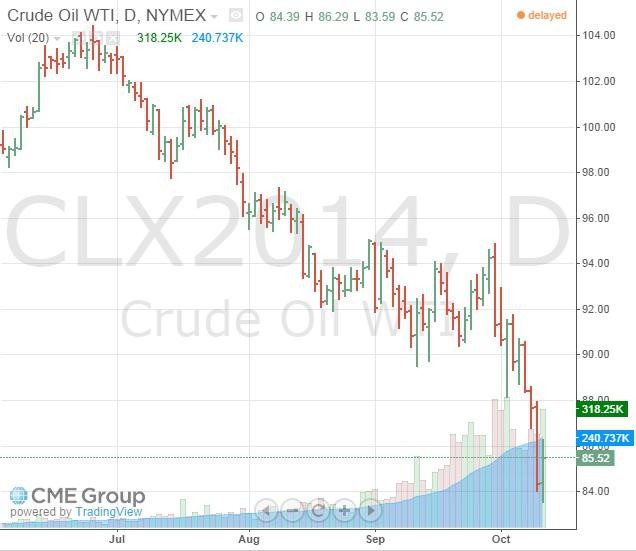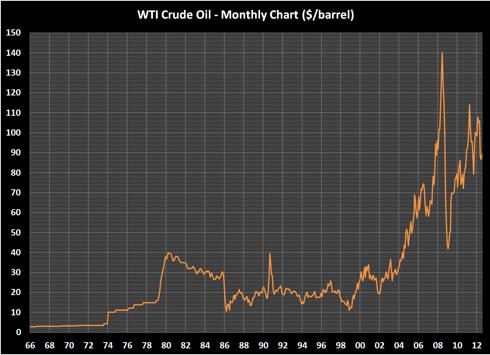The Best Way to Invest in Oil
Post on: 5 Июнь, 2015 No Comment

Warren Buffett has recently said hes interested in alternative energy investments. However, his Berkshire Hathaway has an impressive $7 billion invested in five more-traditional energy companies.
ExxonMobil (XOM) receives a large chunk of these funds. Suncor (SU). meanwhile, is Berkshires second-largest energy holding.
ConocoPhillips (COP). COP spin-off Phillips 66 (PSX) and National-Oilwell Varco (NOV) round out this impressive list, according to the companys recent Form 13F filing.
Generally investors could do well following Buffetts lead. But when it comes to the energy space, hes faced significant losses such as COP in 2007 & 2008 and the passing shale boom that he wasnt able to cash in on.
Plus, when his company takes an $873 million loss, like it did earlier this year on an Energy Future Holdings bond due to the poor prices in the natural gas market, it should give regular investors pause.
While I have a tremendous amount of respect for Mr. Buffett and agree that the energy space offers a tremendous amount of value, Ill tell you today where Im seeing it instead
This could Revolutionize your Gold trading
The gold market has been running on empty for over a year now.
But in James DiGeorgias unique investor report, The Secret Gold Account, you can learn all about:
- The 18-digit code that unlocks a secret gold account thats hidden in most broker platforms
- Collecting underground dividends from the worlds largest gold and silver miners
- The gold accelerator method that could boost your returns on gold and silver stocks up to 4-times higher.
And how to put it all together to create The Ultimate Gold and Energy Portfolio that historically has crushed all of the major market indices.
Internal Sponsorship
The Best Way to Buy Oil Companies
Every few years, I do a comprehensive review of more than 30 exploration and production (E&P) companies. Ive recently completed my newest reserve study, and you can look forward to learning some of my key findings the coming weeks.
Many of these companies have been shifting more of their capital spending and efforts from natural gas to finding oil and natural gas liquids. Several are having success, and their success is being reflected in their stock prices.
This research helps me to determine the best energy stocks to recommend to my Gold and Energy Investor subscribers. As many of them know, the ideal energy company I like to recommend and own would have a high percentage of oil reserves.
Specifically, a high oil-to-natural-gas ratio is one of the most important metrics to help determine which energy stocks to recommend.
In my opinion, its a good idea to own more oil than natural gas. Thats because I believe oil will gain more value over time, and so will E&P companies with high oil-to-gas ratios.
5 More Metrics to Help You Strike Oil
But if youre looking to strike oil with the right companies, this is just one metric to watch.
You should also be on the lookout for high replacement levels low finding and development (F&D) costs a low value to those reserves by the market long reserve lives and good financial health.
Unfortunately, no company has all these characteristics. But several companies get high marks in many of these areas.
The Power of Proved Reserves
I focus on energy exploration and production (E&P) companies because they offer the best way to invest in oil. You are an owner in the companies reserves and leases.
A companys Proved Reserves are extremely important. This term has a very specific definition. According to the U.S. Securities and Exchange Commission, proved oil reserves are:
[T]he estimated quantities of crude oil, natural gas and natural gas liquids which, by analysis of geoscience and engineering data, can be estimated with reasonable certainty to be economically producible from a given date forward, from known reservoirs and under existing economic conditions, operating methods, and government regulations prior to the time at which contracts providing the right to operate expire, unless evidence indicates renewal is reasonably certain.
Below is a table that compares four years of studies Ive completed regarding reserves:
* Most companies combine their oil and natural gas liquids when reporting their oil reserves.
For the last decade, many E&P companies were replacing their reserves with natural gas. In 2006, 51.53% of reserves were oil. Now, the oil-to-gas ratio has climbed to 59%. Its good to see the trend of rising oil and natural gas liquids reserves.
The increase in the oil to natural gas ratio for many companies can be attributed to the oil shale revolution happening in the U.S.
Oil reserves dropped dramatically from 2006 to 2009. Why?
2009s reserves fell because prices dropped so much in late 2008, that oil companies couldnt report reserves that were below market prices from the previous year (per U.S. accounting rules).

As prices rebounded, companies were able to report those reserves again.
I follow about 35 E&P companies; below are 30 companies with their oil to natural gas ratios:
Click to view this chart full-size.
BOE = Barrels of oil equivalent (oil, natural gas, and natural gas liquids reserves are combined).
Canadian Natural Resources (CNQ ), Suncor Energy (SU ), Occidental Petroleum (OXY ), Marathon Oil (MRO ), Hess Corp. (HES ), Continental Resources (CLR ), Pioneer Natural Resources Co. (PXD ), EOG Resources (EOG ), Apache (APA ), Devon Energy (DVN ), Anadarko Petroleum Corporation (APC ), Encana (ECA ), Noble Energy (NBL ) and Talisman Energy (TLM ) have over 1 billion BOE .
Most of the companies in our research are from the U.S.; four are Canadian. About half of the reserves reside in the U.S. the rest hail from Canada along with the rest of the world (i.e. Latin America, Middle East, Africa, Asia, Europe, etc.).
More Reasons to Like Oil
In determining the oil-to-natural-gas ratio in these companies, it became difficult to appropriate how much of these oil reserves were actually oil and how much was natural gas liquids. (Natural gas liquids dont have the margins of oil.)
Most of the Canadian stocks (SU, CNQ, ECA, TLM) oil reserves are oil sands that are worth less than U.S. oil reserves. Oil sands are harder to develop and refine, and they cause many environmental problems.
The last column in the chart could help us determine which companies truly have more oil than natural gas liquids. We took 2013 revenue numbers divided by production numbers.
Companies with higher dollar amounts probably mean that they have a higher percentage of oil versus natural gas liquids and dry natural gas. The lower the number probably means more of their production comes from natural gas liquids and natural gas.
Here are some important takeaways:
- Denbury Resources (DNR). Halcon Resources (HK) and Marathon Oil (MRO) probably have the highest percentage of oil in their production.
- Canadian Natural Resources (CNQ) had the lowest revenue over production.
- Suncor Energy (SU) could not be determined because they have other sources of revenue besides production. Most of its reserves are oil sands.
The last three companies on the list have very high natural-gas-to-oil reserves.
Remember, Suncor is one of Berkshires holdings (to the tune of about $450 million). Its an interesting play because of its high reserves, good financial health and regular dividend.
As for Berkshires other energy holdings, I am inclined to avoid ExxonMobil and ConocoPhillips because theyre what we call integrateds that is, theyre not pure plays on oil.
They are also huge companies that have many low-margin businesses (i.e. retail, refining, chemicals, and oil-and-natural-gas transportation/transmission).
Over the next few weeks, I will report on other helpful findings that can help determine which oil companies to recommend and own.
Even better, if youre interested in receiving timely, detailed and actionable trade alerts in my favorite energy names, I invite you to sign up for a trial subscription to my Gold and Energy Investor service. Click this link to get started today..
Good gold and energy investing,
Dan Hassey
Dan Hassey is the Senior Stock Analyst for James DiGeorgia’s Gold and Energy Investor newsletter and his Superstock Investor service.














